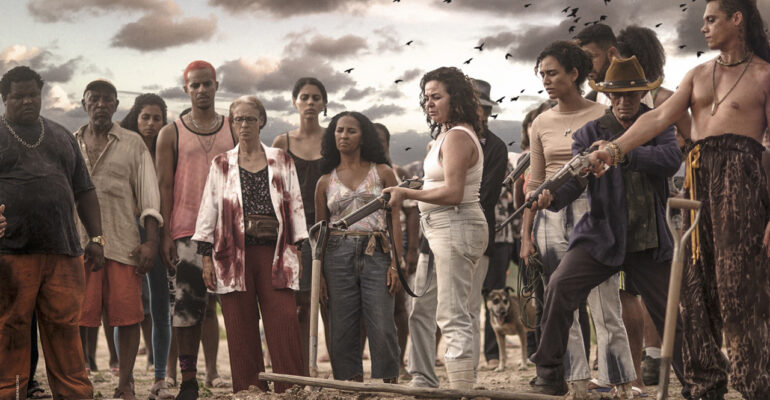Bacurau: A Dystopian Masterpiece of Brazilian Cinema
Bacurau: A Dystopian Masterpiece of Brazilian Cinema
Why Writing About Bacurau Is a Challenge
Discussing Bacurau is no easy task. First, because I am an avid fan of Kleber Mendonça Filho, who directed the film alongside Juliano Dornelles. Second, as someone born in São Paulo but living in the northeastern state of Paraíba since 1994, I feel a strong connection to the people of Bacurau—far more than to two other characters who appear just before the film’s first turning point.
Another challenge is the film’s many references. The village school’s name, João Carpinteiro, is a clear homage to filmmaker John Carpenter. The way the mystery unfolds in Bacurau also draws inspiration from Carpenter’s storytelling techniques.
Bacurau—A Forgotten Village That Represents Many
Released in 2019, Bacurau presents a fictional small village, yet it realistically portrays the harsh reality of an abandoned, impoverished, and disregarded place. The film highlights how many communities in Brazil—whether in remote rural areas or urban favelas in cities like Rio de Janeiro, São Paulo, Belo Horizonte, Salvador, and Recife—are treated as disposable by politicians and parts of society.
A Unique Cinematic Perspective on the Brazilian Northeast
The film’s opening shot takes us to outer space before placing us inside a water truck transporting Teresa (played by Bárbara Colen) back to Bacurau for her grandmother Carmelita’s funeral. Teresa is the focal point of the film’s long first act, guiding us through the village and introducing its geography, people, and social dynamics. However, after the first major plot twist, Bacurau shifts into an ensemble story where the village itself becomes the protagonist.
Bacurau’s Social Commentary on Internal Xenophobia in Brazil
Bacurau makes a bold statement about the unjust valuation of human lives based on birthplace, social conditions, or financial status. The film exposes internal xenophobia in Brazil, particularly against the northeastern population, and challenges the illusion of regional superiority. It reminds audiences that if you were born in Brazil, you are, metaphorically speaking, a bacurau.
The Outsiders—Karine Teles and Antonio Saboia’s Characters
The film is filled with iconic sequences. As the plot unfolds, an initially insignificant village museum gains tremendous symbolic weight. It suggests that the tragic event depicted in the film may not have been the first of its kind.
Despite being set in the near future, Bacurau tackles contemporary issues, portraying conflicts between people from vastly different backgrounds. The film’s first act is reflective, symbolic, and immersive, while the second and third acts introduce a dynamic shift, forcing Bacurau’s residents to react violently out of sheer necessity. The film doesn’t glorify violence—it presents it as a reluctant means of survival.
The Unpredictability That Makes Bacurau So Gripping
A key element that makes Bacurau unsettling is its unpredictability. Even when we think we understand what is happening, the plot takes unexpected turns. The long, immersive first act deeply connects viewers with the village and its people, making us fear for their safety as tensions rise.
A Stellar Cast That Blends Experience and Fresh Talent
The film boasts both veteran and lesser-known actors, yet the ensemble works seamlessly to create a unified community. Standout performances include Silvero Pereira, Sônia Braga, Bárbara Colen, Karine Teles, Antonio Saboia, Thomas Aquino, Lia de Itamaracá, Udo Kier, Brian Townes, Luciana Souza, Alli Willow, and Wilson Rabelo. The film’s strong performances solidify it as a modern classic of Brazilian cinema.
Bacurau’s International Recognition and Awards
Before its Brazilian theatrical release, Bacurau had an impressive international campaign, earning several prestigious awards:
- Jury Prize at the Cannes Film Festival (France)
- Best Foreign Film at the Munich Film Festival (Germany)
- Best Film at the Lima Film Festival (Peru)
- Six wins at the Grande Prêmio do Cinema Brasileiro, including Best Film, Best Director, Best Original Screenplay, Best Editing, Best Visual Effects, and Best Actor (Silvero Pereira).
A Genre-Bending Masterpiece
Kleber Mendonça Filho and Juliano Dornelles skillfully blend multiple genres, including drama, mystery, thriller, sci-fi, western, and action. The result? A striking, authentic, and innovative film that stands out as one of the most exceptional works in contemporary Brazilian cinema.
Learn Portuguese the Brazilian Way! 🇧🇷✨
At The Brazilian Ways, we believe language learning should be fun, immersive, and deeply connected to culture. Our unique courses help you speak Portuguese naturally while experiencing Brazil through its music, films, literature, and dance.
🎶 The Brazilian Music Club – Learn Portuguese through the rhythm and lyrics of Brazilian music.
🎬 The Movie Club – Improve your Portuguese while exploring the best of Brazilian cinema.
📖 The Short Story Club – Enhance your skills by diving into Brazilian literature.
💃 Portuguese for Zouk – Connect with the Zouk dance community while learning Portuguese.
✨ Join a vibrant community of learners and experience Brazil through language!
👉 Explore our programs and start today! 🚀
📲 Follow us on Instagram for more engaging content, language tips, and cultural insights: @thebrazilianways













